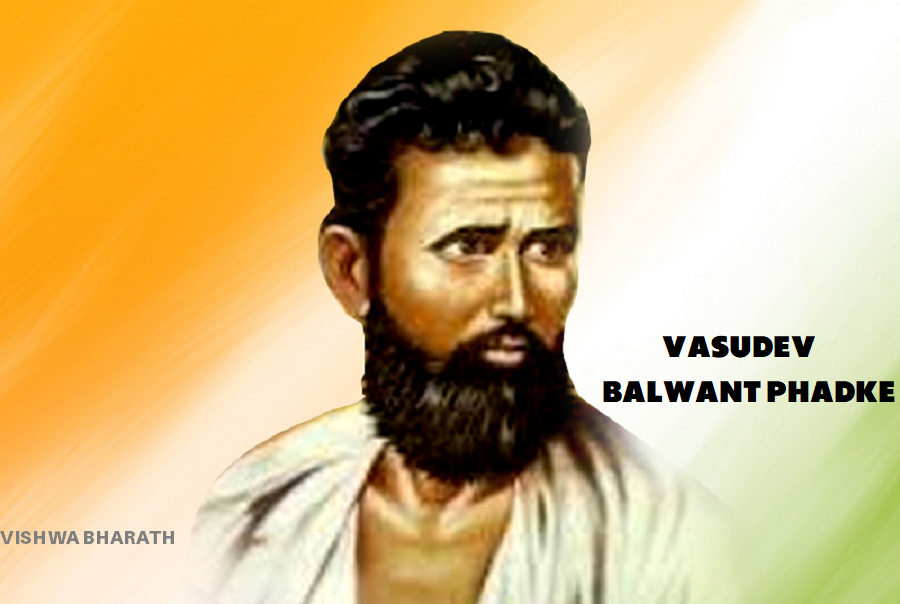వాసుదేవ బలవంత్ ఫడ్కే( 4 నవంబర్ 1845 -17 ఫిబ్రవరి 1883) స్వతంత్ర యోధుడు. ఆయన వ్యవసాయ కుటుంబానికి చెందిన వాడు. వీరి కుటుంబం అత్యంత దురవస్థ అనుభవిస్తూ ఉండేది. స్వరాజ్య సాధనే పరిస్థితులు మెరుగు పరుచుకుందుకు మార్గమని ఫడ్కే తలచారు.
1876 -77 సంవత్సరంలో మహారాష్ట్రలో అత్యంత భయంకరమైన కరువు తాండవించింది. వేలకొలది ప్రజలు ఆకలితో అలమటిస్తూ మరణించారు. మరోపక్క ఆ పంటను చేజిక్కించుకున్న తెల్లదొరలు, మరణాలను ఏమాత్రం పట్టించుకోలేదు. ఇది వాసుదేవ్ బలవంత్ ఫడ్కే భరించలేకపోయారు. అతని మనసు కుతకుత లాడింది. మహారాష్ట్రలోని కోలీలు ,భీల్ లు, ధంగారులు తెగల వారిని కూడగట్టుకొని ఒక తిరుగుబాటు సేనను తయారుచేసి దానికి ” రామొషి” అని పేరు పెట్టారు. వారంతా ఏకమై బ్రిటిష్ పరిపాలన అంతం చేయడానికి సాయుధ పోరాటాన్ని సాగించారు. మొట్ట మొదట వీరు ధనవంతులైన బ్రిటిష్ వ్యాపారవేత్తల పై దాడులకు పూనుకున్నారు. ఇలా సాయుధపోరాటానికి అవసరమైన ధనం సంపాదించడానికి ప్రయత్నించారు. ఫడ్కే తన డైరీలో “ఈ దేశ ప్రజలందరూ నాలాగా భరతమాత ముద్దుబిడ్డలే. వారంతా అలమటిస్తూంటే, ఏమీ పట్టనట్టుగా జీవించడమనే ఊహే నాకు భయంకరమైనది. వారికి స్వతంత్రం ఇవ్వడం కోసం, అవసరం అయితే నా జీవితాన్ని త్యాగం చేస్తాను” అని రాసుకున్నారు.
ఫడ్కే ఉద్యమ ప్రభావం చూసి బ్రిటిష్ ప్రభుత్వం చాలా ఇరకాటంలో పడింది. ఫడ్కేను పట్టుకునేందుకు వలను పన్నారు. బొంబాయి ప్రభుత్వ గవర్నర్ అయిన సర్ రిచర్డ్ టెంపుల్ ఫడ్కేను చంపిన లేక బంధించిన వారికి 5వేల రూపాయల బహుమతిని ప్రకటించారు. దీనికి జవాబుగా బొంబాయి గవర్నర్ సర్ రిచర్జ్ టెంపుల్ తలను తెచ్చిన వారికి పదివేల బహుమతి ఇస్తానని మరో ప్రకటన చేశాడు ఫడ్కే. ఫడ్కేను పట్టుకునేందుకు ప్రభుత్వం తన ప్రయత్నాలను వేగవంతం చేసింది . నిజాం ప్రభుత్వం, బ్రిటిష్ ప్రభుత్వం రెండూ ఫడ్కేను పట్టుకునేందుకు వెంటాడుతూనే ఉన్నాయి. అదే సమయంలో ఫడ్కే నిజాం రాజ్యానికి చేరుకున్నాడు . ఒక రోజు మొత్తం పరిగెడుతూనే ఉండడం వల్ల చాలా అలసిపోయి ఉన్న ఫడ్కేకు జ్వరం కూడా వచ్చింది. హైదరాబాదులోని కలాడిగిన తాలూకాలోని ఒక పల్లెటూరికి చేరారు. విశ్రాంతి కోసం దేవి మందిరంలో పడుకున్నారు. జ్వరంతో సృహతప్పిన స్థితిలో ఉన్నారు. అతనిని వెంటాడుతూ బ్రిటిష్ ఆర్మీ మేజర్ డయనిల్ అక్కడికి చేరుకున్నాడు. తన బలగాలను అక్కడ మోహరించి, ఫడ్కే గుండెలపై తంతూ, మెడ మీద కాలు పెట్టి ” ఫడ్కే, ఇప్పుడు నీకు ఏం కావాలి” అని అడిగాడు. “నీతో యుద్ధం చేద్దామనుకుంటున్నాను”అని సమాధానం చెప్పాడు ఫడ్కే. కానీ అందుకు ఒప్పుకోని డానియల్ అతనికి బేడీలు వేసి పూనా తీసుకొని వెళ్ళాడు. ఫడ్కేను అక్కడ నుంచి ఆడిన్ కారాగారానికి తరలించారు. కానీ ఫడ్కే 13తేది ఫిబ్రవరి 1883 న అక్కడ నుంచి తప్పించుకున్నారు. అయితే ఆ తరువాత అతి కొద్ది కాలంలోనే తిరిగి పట్టుబడ్డారు. అప్పుడు వాసుదేవ్ బలవంత్ ఫడ్కే ఆమరణ నిరాహార దీక్ష చేపట్టారు. ఈ దీక్ష కారణంగా 17 ఫిబ్రవరి 1883 న ఫడ్కే తన తుది శ్వాస విడిచారు.
Remembering Vasudev Balwant Phadke
Vasudeo Balwant Phadke (Marathi: वासुदेव बळवंत फडके) was an Indian revolutionary and is widely regarded as the father of the armed struggle for India’s independence. Phadke was moved by the plight of the farmer community during the British Raj. Phadke believed that ‘Swaraj’ was the only remedy for their ills. With the help of Ramoshis, Kolis, Bhils, and Dhangars communities in Maharastra, Vasudev formed a revolutionary group called Ramoshi. The group started an armed struggle to overthrow the British Raj. The group launched raids on rich English businessmen to obtain funds for their liberation struggle. Phadke came into the limelight when he got control of the city of Pune for a few days when he caught the British soldiers off guard during one of his surprise attacks.
Early Age
Vasudev was born on 1845-11-04 in Shirdhon village of Panvel taluka based in Raigad district in Maharashtra state in a Marathi Chitpavan Brahmin family. As a child Vasudev preferred learning skills like wrestling, riding over high school education, and dropping out of school. Eventually, he moved to Pune and took the job as a clerk with the military accounts department in Pune for 15 years. Krantiveer Lahuji Vastad Salve a then prominent social figure based in Pune was the mentor of Vasudev. Lahuji Salve, an expert wrestler operated a gymnasium. Lahuji preached the importance of independence from the British Raj. Lahuji belonged to the Mang community an untouchable community, taught Vasudev the importance of getting backward castes into the mainstream freedom movement. It was during this period that Vasudev began attending lectures by Govind Ranade which mainly focused on how the British Raj policies hurt the Indian economy. Vasudev was deeply hurt by how this was leading to widespread suffering in society. In 1870, he joined a public agitation in Pune that was aimed at addressing people’s grievances. Vasudev founded an institution, the Aikya Vardhini Sabha, to educate the youth. While working as a clerk, Vasudev was not able to see his dying mother due to the delay in the approval of his leave. This incident enraged Vasudev and happened to be the turning point in his life.
Revolt with the help of the Ramoshi’s
In 1875, after the then Gaikwad ruler of Baroda was deposed by the British, Phadke launched protest speeches against the government. Severe famine coupled with the evident apathy of the British administration propelled him to tour the Deccan region, urging people to strive for a free republic. Unable to get support from the educated classes, he gathered a band of people from the Ramoshi caste. People from the Kolis, Bhils, and Dhangars were also included later. He taught himself to shoot, ride and fence. He organized around 300 men into an insurgent group that aimed at liberating India from British rule. Vasudev intended to build an army of their own but lacking funds they decided to break into government treasuries. The first raid was done in a village called Dhamari in Shirur taluka in the Pune district. The income tax which was collected for British Raj was kept in the house of local businessman Mr. Balchand Fojmal Sankla. They attacked the house and took the money for the benefit of famine-stricken villagers. There they collected about four hundred rupees but this led to his being branded as a dacoit. To save himself Vasudev had to flee from village to village, sheltered by his sympathizers and well-wishers, mostly the lower class of the society. Impressed by his zeal and determination, the villagers of Nanagaum offered him protection and cover in the local forest. The general plot would be to cut off all the communications of British forces and then raid the treasury. The main purpose of these raids was to feed famine-affected farmer communities. Vasudev performed many such raids in areas near Shirur and Khed talukas in Pune.
Meanwhile, Vasudev continued his raids and increased his follower base. The monetary situation of the movement improved. But then Vasudev had a realization the people around him were more interested in his loot, or wealth than in the ideals that he wanted to fight for. Vasudev decided it was time for him to find a new place. He decided to move the south and headed for the Shri Shaila Mallikarjun shrine. After overcoming the moral defeat, Vasudev again recruited about 500 Rohilas to form a strong army to start afresh fight against the British Raj.
Capture and death
Vasudev’s plans to organize several simultaneously attacks against the British Raj nationwide were met with very limited success. He once had a direct engagement with the British army in the village of Ghanur, whereafter the government offered a bounty for his capture. Not to be outdone, Phadke in turned offered a bounty for the capture of the Governor of Bombay, announced a reward for the killing of each European, and issued other threats to the government. He then fled to Hyderabad State to recruit Rohilla and Arabs into his organization. A British Major, Henry William Daniell, and Abdul Haque, Police Commissioner to the Nizam of Hyderabad, pursued the fleeing Vasudev day and night. The British move to offer a bounty for his capture met with success: someone betrayed Phadke, and he was captured in a temple after a fierce fight at the district of Kaladgi on 20 July 1879 while he was on his way to Pandharpur. From here he was taken to Pune for trial. Vasudev and his comrades were housed in the district session court jail building, near Sangam bridge, which now happens to be the state C.I.D. building. His own diary provided evidence to have him sentenced for life. Vasudev was transported to jail at Aden but escaped from the prison by taking the door off from its hinges on 13 February 1883. But his escape was too short-lived: he was recaptured and put back in prison. Vasudev then went on a hunger strike to death. On 17 February 1883 Vasudev breathed his last breath as a result of his protest hunger strike.
Inspirational figure
One of the reasons for Vasudev to be known as the father of the Indian armed rebellion was the fact that he was the source of inspiration for a couple of fellow freedom fighters. Bankim Chandra Chatterjee’s famous patriotic novel Anand Math incorporated various contemporary acts of patriotism performed by Vasudev during his freedom struggle. As the British government didn't like this, Bankim had to print up to 5 editions of the book to tone down these stories.
,,,,,, Vishwa Samvad





















